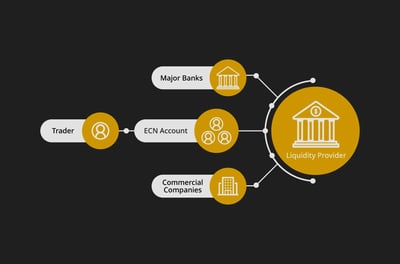Table Of Contents
What's the Difference Between the ECN Account vs Standard Account and Which One is Best?
I've found this to be one of the most important questions a FOREX trader faces at the beginning of their career: "what type of broker will I use?" There is a wide range of broker types from which to choose. Different brokers offer several distinct features and account types.
Two account types in the FOREX world that are commonly compared side by side are the Electronic Communications Network (ECN) account, and the standard account. Deciding between the two will come down to which of the main characteristics of each account a trader feels is most important to them.
As the FOREX market is not centralized and does not take place on a regulated exchange, it is often the case that traders can pursue the exact trading conditions with which they feel most comfortable. A key contributor to the trading conditions consideration is whether to choose an ECN account or a standard account. In this article, we'll tell you how.
ECN accounts connect you directly to liquidity providers, offering tighter spreads and faster execution
Standard accounts use fixed spreads and the broker acts as your counterparty, which simplifies trading for beginners
ECN accounts are ideal for scalpers and day traders who want speed, transparency and access to institutional pricing
Standard accounts suit new traders who value predictable costs and simpler order execution
ECN brokers charge commissions per trade, but their low spreads can still make them more cost-effective in the long run
Standard accounts come with higher spreads but no commissions, making them easier to understand for casual traders
ECN accounts offer better market depth, no dealing desk interference and allow strategies like scalping and bot trading
Traders often start with a standard account but switch to ECN once they gain experience and want tighter pricing
What Is an ECN Account?
From what I've learned in my trading career, an ECN broker is one that uses electronic communications networks to directly connect traders with important players in the FOREX market. These players provide, among other services, access to equity, liquidity, and currency. They could be banks, hedge funds, and other brokers. This trading type deserves special mention because before the days of safe and instantaneous global communications, ECN trading was not possible.
In the days before dependable ECN services, FOREX trading was conducted primarily along the lines of the service offered by a standard account, which is a where a broker acts as a counterparty to the trader’s orders. While acting as the counterparty, the broker deals with the market participants it requires to execute the trade out of sight of the trader.
Today, ECN brokers remove themselves as the counterparty and match traders’ orders directly with players, like liquidity providers. By consolidating real-time price quotations from carefully selected partners, the broker can provide the trader with extremely tight bid/ask spreads. The broker gives the trader access to better spreads and extracts a commission in exchange for this service.
One crucial factor to note about ECN brokers is that they match orders between market participants, but they cannot trade against clients. Therefore, it is by design that ECN spreads are tighter than the spreads offered by normal brokers. However, in exchange for spreads as low as 0.0 pips, ECN brokers always take a commission per transaction. It is for this reason that ECN brokers are known as non-dealing desk brokers. This simply means that they put participants in a trade together in electronic form and do not execute the deal themselves.
Now that we know what an ECN broker is, we can see that an ECN account is nothing more than an account where the broker can match the trader’s orders by putting them in direct contact with third parties who can execute their trades. It is the fastest and most efficient way to put traders in touch with FOREX players, like banks, hedge funds, and other liquidity companies. So, the question is, who would be attracted to this type of account? Well, in the FOREX world, scalpers and day traders would be two types of investors for whom rapid and trustworthy performance is a big draw.
Recommended Brokers
What Is a Standard Account?
I've used this type of account often enough to say that the standard trading account is one where the broker acts as the counterparty to your trade. Each trade needs at least two parties, a buyer and a seller. In this case, you buy FOREX directly from the broker without concerning yourself about other market participants from which they are procuring liquidity services.
This type of account uses fixed spreads, meaning that the broker will normally inflate the difference between the bid and ask amounts by a figure of their choosing, usually about 2 pips. This way, the trader knows what to expect before every transaction. The fee calculations involved in a standard account are simple and predictable, which is an important benefit to a new trader.
Standard accounts require a bigger financial investment because it is a slower-moving market than ECN trading, where many smaller trades can take place instantaneously over electronic channels. Standard account holders are allowed access to standard lots in each currency. A standard lot is worth $100,000, but with leverage of, say, 100:1, you only need to provide $1,000 to start to trade.
A new trader can become highly conversant with this type of account and make good money, but they should not forget that the fixed spreads are higher by design, and, over the long term, they could get lower spreads with other types of accounts, like the ECN account.
ECN Network Explained

The Difference between an ECN and a Standard Account
In my opinion, there are some significant differences between the two account types:
ECN trades are executed when the broker connects the trader directly to liquidity providers. This is a non-dealing desk model. Standard account trades are filled from within the broker’s partner pool, rendering this a market-making model.
ECN accounts simply match orders and charge a commission per trade for the service. ECN accounts do not place a premium on the raw spread, which can be as tight as 0.0 pips.
By contrast, standard trading accounts apply premiums to the raw spreads as their primary revenue line. As a Standard Account holder, it is widespread practice for you to pay a two-pip spread on most currency pairs. As the counterparty to your transaction, the broker needs to make money from the trade.
ECN accounts come with a lower effective fee amount than standard accounts. I will show you how this works out later in the article.
Pros and Cons of an ECN Account
Here are some key factors to consider before opening an ECN account:
Pros explained
The main benefits of the ECN account can be grouped into transparency, fairness and speed. With ECN trading, all brokers have access to the same information in the form of a market newsfeed that shows up-to-the-minute pricing, including price history.
This means there is ample information that allows traders to spot trends in the market. There is also less chance of price manipulation, something that traders appreciate as their skill levels improve and they come to better understand the trading landscape.
ECN trading provides a faster paced institutional level of transacting. It is much more akin to how professionals trade. ECN brokers thrive on high trade volumes, something that can only be achieved when you get large numbers of skilled and knowledgeable traders working together in a bustling marketplace.
ECN brokers allow investors a way to trade outside of normal trading hours. This is an effective way for traders who cannot take part in the market during standard working hours to partake in it. ECN accounts provide greater flexibility as they provide electronic access to markets on a 24/5 basis.
ECN brokers offer superior privacy. For those worried about their information being transmitted over electronic channels, there is an elevated level of anonymity to ECN trading as all participants invest in the most up-to-date security features.
Tighter Spreads – ECN accounts provide access to interbank liquidity, often resulting in tighter spreads compared to traditional market makers. This is particularly beneficial for scalpers and day traders who rely on small price movements.
No dealing desk (NDD) execution – Unlike market makers, ECN brokers do not take the opposite side of trades. This eliminates conflicts of interest, ensuring that traders receive true market pricing without broker manipulation.
Access to institutional liquidity – ECN accounts provide direct access to banks, hedge funds, and institutional market makers, leading to more competitive pricing and deeper liquidity, especially in major forex pairs.
Ideal for scalping and high-frequency trading (HFT). Since ECN brokers do not restrict scalping strategies, traders can execute rapid trades without broker intervention or re-quotes.
Lower slippage during high liquidity periods. Unlike market makers that may delay order execution, ECN accounts provide instant access to liquidity, reducing slippage in normal market conditions.
No trading restrictions. Many ECN brokers allow news trading, scalping, and algorithmic or bot trading, which are often restricted by dealing desk brokers.
Potential for lower costs on large trades. While ECN brokers charge commissions, active traders may find that the tight spreads compensate for this, especially when executing large-volume trades.
More accurate pricing during market volatility. Since prices are aggregated from multiple liquidity providers, ECN accounts reflect true market conditions rather than broker-adjusted pricing, which can be distorted during volatile events.
Cons explained
ECN liquidity can sometimes run low. Often, when important economic news is about to break, traders will choose to hold off on trading. It could even be liquidity providers that throttle supply in anticipation of a rise in demand. This can cause trading lulls in which liquidity is scarce due to market dynamics.
Higher trading costs. ECN brokers typically charge commissions per trade, which can add up, especially for high-frequency traders. Unlike market makers who profit from spreads, ECN accounts rely on commissions, making trading more expensive in some cases.
Variable spreads. While ECN accounts offer tight spreads, they fluctuate depending on market conditions. During times of low liquidity, such as after market close or during economic events, spreads can widen significantly, increasing trading costs.
Slippage and market volatility – Because ECN accounts connect traders to live market prices, they are exposed to price gaps and slippage, particularly in fast-moving markets. This can lead to orders being executed at less favorable prices, impacting strategy effectiveness.
No guaranteed execution. Unlike dealing desk brokers that absorb some market fluctuations, ECN brokers only match buyers and sellers. This means that large orders may experience partial fills or execution delays if liquidity is insufficient.
Limited leverage and margin requirements. Some ECN brokers impose stricter margin requirements compared to standard retail accounts. Higher capital requirements may limit the ability of smaller traders to use leverage effectively.
Complex order execution. ECN accounts often require a more advanced understanding of order types, liquidity depth, and market execution. Traders may need to adjust their strategies to account for variable spreads, commissions, and execution speeds.
Inactivity fees. Some ECN brokers charge fees for accounts that remain inactive over a period of time, making them less suitable for casual or infrequent traders.
Pros and Cons of a Standard Account
Here are the factors to consider before opening a standard account:
Pros explained
Standard accounts are easy to handle and the cost of execution, although a little higher than some traders prefer, comes with the benefit of predictability. Working with fixed spreads is unthinkable to some traders as it seems restrictive, but other traders, especially novices, sit on the other side of the fence and appreciate the predictability of fixed spreads.
Knowing that each trade will cost you two pips regardless of market conditions could work for traders in times of volatility. Knowing exactly what fees to expect makes it easier to plan. Swing traders enjoy this type of account.
A swing trader takes up longer positions, from a few days to several weeks. Their intention is to take advantage of currency swings that can be predicted from world events. By locking in the spread of two pips, they are in a better position to know when they can profitably call in the trade.
No commissions on trades. Standard accounts typically make money through spreads rather than commissions, meaning traders do not pay per-trade fees. This can be beneficial for those who trade less frequently.
Easier for beginners. Standard accounts are generally more user-friendly, with simpler order execution and lower technical complexity compared to ECN accounts, which require an understanding of variable spreads and liquidity depth.
Lower minimum deposit requirements. Many brokers offer standard accounts with lower entry barriers, making them more accessible to beginner traders who do not have large capital to start with.
No partial fills. Since market makers execute orders internally, traders get guaranteed fills at the requested price, rather than experiencing partial fills as can happen in an ECN environment.
Less slippage in low volatility conditions. While ECN accounts are subject to market-driven price changes, standard accounts may offer more stability in calmer market conditions, reducing unexpected price movements on small trades.
Cons explained
If you are a frequent trader, you might be paying something like 1.3 pips extra per trade on a standard account versus an ECN account. This inflated cost of execution adds up in the long term.
Potential for broker manipulation. Standard accounts operate under a dealing desk model, meaning the broker acts as the counterparty to trades. This creates a conflict of interest, as the broker profits when the trader loses.
Slower execution and re-quotes. Orders are processed by the broker rather than directly in the market, which can lead to slower execution speeds and re-quotes, particularly in volatile conditions.
Limited scalping and HFT options: Many brokers impose restrictions on scalping and automated trading, making standard accounts less suitable for traders who rely on rapid, short-term strategies.
No access to market depth or order book. Unlike ECN accounts that show real-time bid/ask prices from multiple liquidity providers, standard accounts do not offer market transparency, limiting a trader’s ability to gauge order flow.
Higher slippage during volatility. Since the broker controls pricing, traders may experience more slippage when executing orders during major news events or market turbulence.
Fee Structure of Each Account
It is fair to say that the standard account is the realm of newer traders trying to understand the trading landscape. They feel comfort from having a predictable spread, and they can learn the markets from there.
I would say that users of the ECN account, on the other hand, tend to be more advanced in their trading career. They will not settle for entry-level tools and are starting to hunger for a faster and more dynamic interface. They understand that their trades can be directly presented to institutional liquidity providers and they seek that level of market involvement.
As I've mentioned, the ECN account normally comes with very tight spreads, sometimes as low as 0.0 pips. This is an attractive proposition, but there is no such thing as a free lunch, as we all know. ECN brokers make their money from a commission of roughly $3.50 per lot ($100,000) that is standard in the market. Therefore, on a round-turn lot (a complete transaction featuring both the buy and sell portions), ECN account holders would pay $7. Thus, when trading one standard lot, you pay:
With the ECN account, $7 per round turn, which equates to 0.7 pips
With the standard account, the market standard spread of 2 pips
Put another way, because the ECN account bears a commission of $3.50 per lot, or $7 per round turn, it is the equivalent of 0.7 pips if it was a fixed spread. Remember, all it takes for you to complete trades on an ECN account at better execution rates than a Standard Account is anything below what the Standard Account can offer, which is two pips, therefore, 0.7 pips is a far better deal.
Remember, though, that this assumes an ECN spread of 0.0 pips. This is sometimes the case, but not nearly always. Consider that the tightest spreads can be found between dominant currencies with low volatility. As you begin to trade in minor and exotic pairs, you will see spreads widen to cater for volatility. It is the same scenario with ECN accounts. When using this account type, you will sometimes see spreads between selected currency pairs that are rather wide. This must be factored into the financial calculations.
For the most part, traders who are conscious of how much they pay in fees will start to make a comparison between the two accounts and come up with the conclusion at which we have just arrived–ECN trading can be more cost effective than using a standard account.
If you are a trader who recognizes this and is ready to progress in your career, then you will likely graduate from a standard account to an ECN account before too long. Note that your trading plan when using a different type of account should be different. Also, now that you know what a significant impact the type of account has on your trading prospects, you can better gauge who are the best brokers out there.
Conclusion
In my experience, the main difference between ECN accounts and standard accounts is that the ECN account allows you to execute trades at markedly lower fees. The ECN is also faster and much closer to professional trading for those who are looking for an edge.
You might wonder why brokers even bother with the standard account. The reason is that they know FOREX and trading in general is a daunting prospect for any newcomer. By offering a standard account, they can gain a new customer, even if they can be confident that the trader will graduate to an ECN account over time.
The ECN trading account is favored by many retail traders who are serious about their investing career and would like to adopt as professional an approach as possible. After all, ECN trading is fast, fair, and anonymous. Traders get equal treatment in the ECN realm, regardless of the size of their trades.
The standard trading account exists because it gives comfort to traders who are not sure of the ropes just yet. There is a lot to be said for using a broker that offers you the flexibility to trade with the tools that make you comfortable.
Recommended Brokers
FAQ
An ECN account matches your orders with market participants like equity and liquidity partners. The broker does not get involved with your transactions, except to put you in contact with third parties in an electronic marketplace. This non-dealing style means the broker only charges you a commission for providing you with access to its network. The commission figure is normally within a narrow market standard.
An ECN account is an order-matching execution system. The broker charges a commission per trade for access to its electronic service. There is no premium placed on the spreads for this service, only a commission. By using the account, you get direct access to liquidity providers, banks and other brokers as you decide on which orders to place.
A standard account is one where the broker acts as a market maker on your transactions. It takes your orders and sources the liquidity you need from selected partners. You deal with the broker directly and never have access to any other market participants. This means you must accept the spreads the broker offers and the possibility that the broker is leveraging the deal in their favor as they are in control of much more of the order and execution process.
ECN trading is trading through an electronic communications network (ECN) broker. This type of broker offers an order-matching execution service that is conducted over the broker’s electronic platform. The broker charges a commission per trade for the service.
An ECN broker offers a no-dealing desk execution model, where the broker facilitates a client trade by matching buyer and seller. ECN traders are known for having no conflicts of interest with traders who do not act as counterparties to the trade, and only take a commission for their work. The commission is relatively low and traders feel the system is fairer as they have sight of much more information related to their orders than they would with a standard account.
ECN pricing involves charging a fixed commission on trades. Standard accounts levy a premium on the spread, but ECN accounts do not, instead they concentrate on recouping a commission per trade.
Standard account pricing is when brokers widen the spread on a currency pair to ensure they get a cut of the transaction. It is sometimes thought that brokers have a conflict of interest in this scenario as not only does the broker act as the counterparty, meaning they can choose to deal with the third party that most benefits them, but they also get to charge a premium of their choice on that spread.
It is thought that the ECN account works out more cost effectively over time. At the level of pure cost per transaction, the ECN account is probably lower than the standard account. However, when ECN accounts handle minor pairs, or when ECN accounts are used for high volumes of transactions, they can become more expensive, so the difference is not so pronounced.
New traders would benefit from the standard account, which has a predictable fee structure. This is not to limit them. They could start with the ECN account if they are committed to learning as much as they can as quickly as they can. ECN accounts can feature overwhelming levels of detail, but the committed novice can master the market if they apply themselves.
ECN accounts are known for their speed of execution, anonymity and price fairness. Many traders come to appreciate the ECN account even if they start out with a standard account. ECN accounts are known for their transparency as traders see the bid/ask prices directly, free of any intermediary involvement.
If your broker offers both types of accounts, it should not be too difficult to change from one account type to another. Most brokers will offer both account types as they can serve a wider case of traders by offering both.






